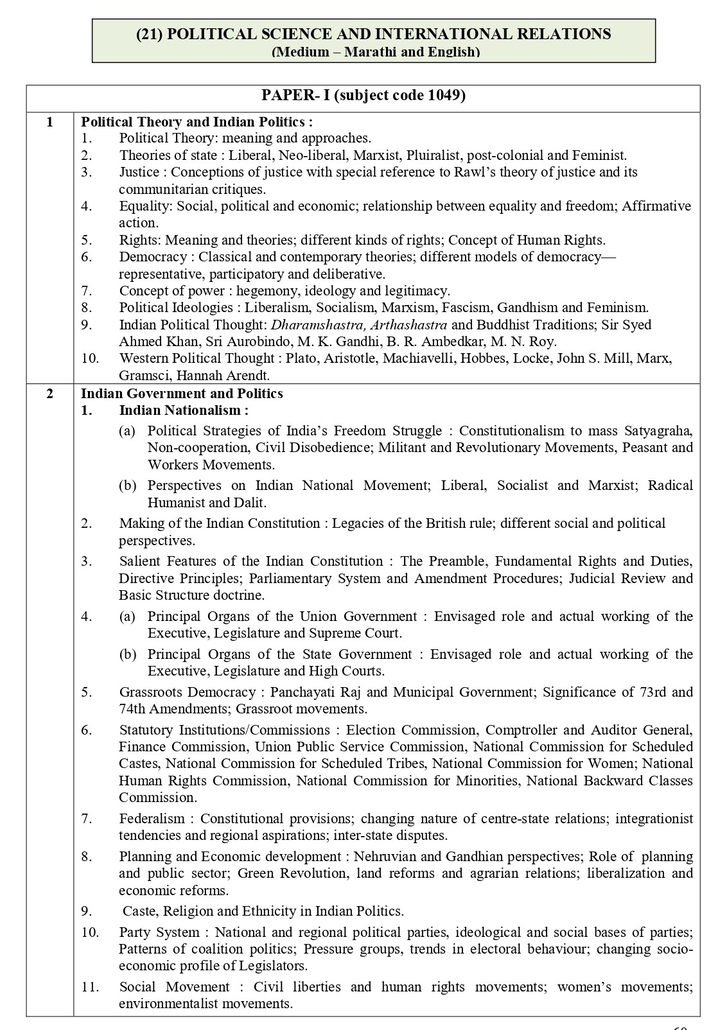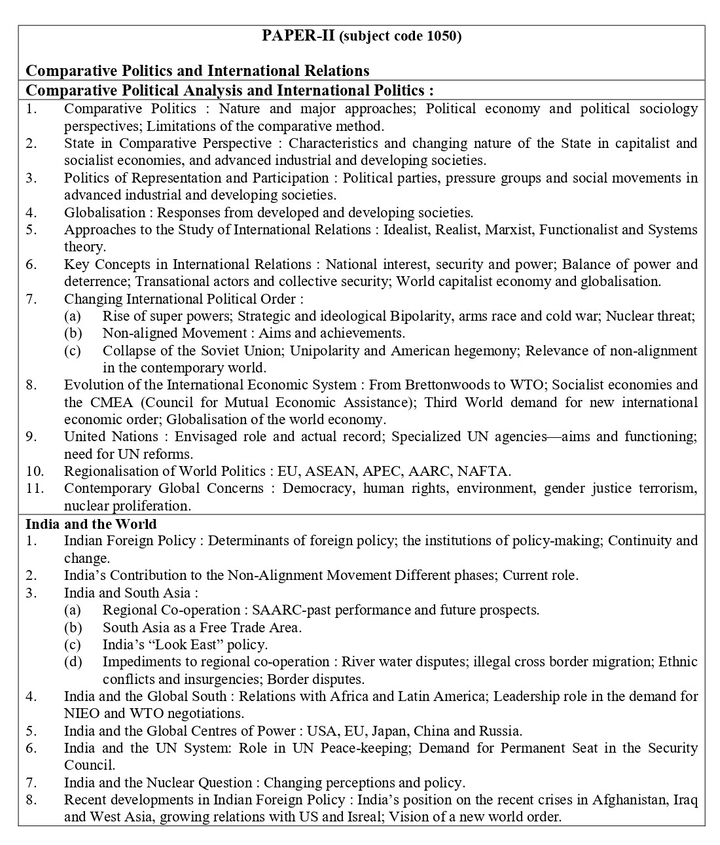- Home/
- Maharashtra State Exams (MPSC)/
- MPSC Rajyaseva/
- Article
MPSC Political Science Syllabus 2023: PSIR Optional Syllabus – Download PDF
By BYJU'S Exam Prep
Updated on: September 25th, 2023

MPSC Political Science Syllabus 2023: Political Science & International Relations (PSIR) is one of the popular MPSC optional subjects for the MPSC Mains Exam 2023. PSIR introduces you to one of the complex subjects, and for an aspiring bureaucrat, it is one of the most useful subjects to learn. However, it is important to have a strong interest in the subject before choosing it as optional. Download MPSC Political Science Syllabus PDF from the link provided below.
This article discusses the MPSC Political Science Syllabus for Paper 1 and 2 in English and Marathi.
राज्यशास्त्र आणि आंतरराष्ट्रीय संबंध (पीएसआयआर) हा एमपीएससी मुख्य परीक्षा 2023 साठी एमपीएससी वैकल्पिक विषयांपैकी एक आहे. PSIR तुम्हाला एका गुंतागुंतीच्या विषयाची ओळख करून देते आणि एका महत्त्वाकांक्षी नोकरशहासाठी, शिकण्यासाठी हा सर्वात उपयुक्त विषयांपैकी एक आहे. मात्र, वैकल्पिक म्हणून निवडण्यापूर्वी त्या विषयाची तीव्र आवड असणं गरजेचं आहे. या लेखात एमपीएससी राज्यशास्त्र (पीएसआयआर) वैकल्पिक अभ्यासक्रम, राज्यशास्त्र तयारीची रणनीती आणि पुस्तक सूची यांची चर्चा केली आहे.
Table of content
-
1.
Download MPSC Political Science Syllabus PDF
-
2.
MPSC Political Science Syllabus 2022
-
3.
एमपीएससी राज्यशास्त्र PSIR अभ्यासक्रम: आढावा
-
4.
MPSC Political Science Syllabus: Paper 1
-
5.
MPSC Political Science Syllabus: Paper 2
-
6.
एमपीएससी राज्यशास्त्र PSIR अभ्यासक्रम: पेपर 1
-
7.
एमपीएससी राज्यशास्त्र PSIR अभ्यासक्रम: पेपर 2
-
8.
How to Prepare for MPSC Political Science (PSIR) Syllabus
-
9.
MPSC Political Science Syllabus: Booklist
Download MPSC Political Science Syllabus PDF
MPSC Political Science Syllabus is highly beneficial even after clearing the MPSC Rajyaseva exam as essential topics can be applied to your government job. Download the MPSC Syllabus for Political Science PDF in English and Marathi using the direct link below.
MPSC Political Science Syllabus in English, Download PDF
MPSC Political Science Syllabus in Marathi, Download PDF
MPSC Political Science Syllabus 2022
For the MPSC Exam, Political Science and International Relations (PSIR), as it is commonly known, is a subject for which a large amount of study material is available in English and Marathi. MPSC Political Science syllabus includes topics like Freedom Struggle and Indian Politics, Constitution of India, International Economic System and Trade, International Organizations, India’s Foreign Policy, Peacekeeping, etc. These subjects are also part of the syllabus for General Studies Paper 2.
| MPSC PSIR Syllabus | Sub-Topics |
| MPSC PSIR Syllabus for Paper 1 | Section A: Political Theory and Indian Politics |
| Section B: Indian Government and Politics | |
| MPSC PSIR Syllabus for Paper 2 | Section A: Comparative Political Analysis and International Politics |
| Section B: India and the World |
एमपीएससी राज्यशास्त्र PSIR अभ्यासक्रम: आढावा
एमपीएससी परीक्षेसाठी राज्यशास्त्र आणि आंतरराष्ट्रीय संबंध (पीएसआयआर) हा विषय सामान्यपणे ओळखला जातो, असा विषय असून त्यासाठी इंग्रजी आणि मराठी भाषेत मोठ्या प्रमाणात अभ्यास साहित्य उपलब्ध आहे. PSIR च्या अभ्यासक्रमात स्वातंत्र्यलढा आणि भारतीय राजकारण, भारताची राज्यघटना, आंतरराष्ट्रीय आर्थिक प्रणाली आणि व्यापार, आंतरराष्ट्रीय संघटना, भारताचे परराष्ट्र धोरण, शांतता, इत्यादी विषयांचा समावेश आहे. हे विषय सामान्य अध्ययन पेपर 2 च्या अभ्यासक्रमाचा देखील एक भाग आहेत.
| MPSC PSIR वैकल्पिक अभ्यासक्रम | उप-विषय |
| पेपर 1 साठी MPSC PSIR वैकल्पिक अभ्यासक्रम | विभाग अ : राजकीय सिद्धांत आणि भारतीय राजकारण |
| विभाग ब: भारत सरकार आणि राजकारण | |
| पेपर 2 साठी MPSC PSIR वैकल्पिक अभ्यासक्रम | विभाग अ : तुलनात्मक राजकीय विश्लेषण आणि आंतरराष्ट्रीय राजकारण |
| विभाग ब: भारत आणि जग |
MPSC Political Science Syllabus: Paper 1
MPSC PSIR optional paper 1 consists of ‘Political Theory and Indian Politics’ subject for 250 marks. The MPSC Political Science syllabus for paper 1 is divided into 2 sections:
- Section 1: Political Theory and Thinkers
- Section 2: Indian Government and Politics
The detailed section-wise syllabus for the MPSC political science (PSIR) paper 1 is given below:

MPSC Political Science Syllabus: Paper 2
MPSC PSIR optional paper 2 consists of ‘Comparative Politics and International Relations subject for 250 marks. MPSC Political Science paper 2 Syllabus is divided into 2 sections:
- Section 1: Comparative Political Analysis and International Politics
- Section 2: India and the World
The detailed section-wise syllabus for the MPSC political science (PSIR) paper 2 is given below:

एमपीएससी राज्यशास्त्र PSIR अभ्यासक्रम: पेपर 1
खाली दिलेल्या सारणी मध्ये आपल्याला राज्यशास्त्र व आंतरराष्ट्रीय संबंध या वैकल्पिक विषयाच्या पेपर 1 चा संपूर्ण अभ्यासक्रम देण्यात आलेला आहे.
| विभाग अ: राजकीय सिद्धांत आणि भारतीय राजकारण | |
| 1 | राजकीय सिद्धांत: अर्थ आणि दृष्टिकोन. |
| 2 | राज्याचे सिद्धांत: उदारमतवादी, नव-उदारमतवादी, मार्क्सवादी, बहुवचनवादी, उत्तर-वसाहतवादी आणि स्त्रीवादी. |
| 3 | न्याय: रॉलच्या न्याय सिद्धांत आणि त्याच्या सामुदायिक टीकांच्या विशेष संदर्भासह न्यायाच्या संकल्पना. |
| 4 | समानता: सामाजिक, राजकीय आणि आर्थिक; समानता आणि स्वातंत्र्य यांच्यातील संबंध; होकारार्थी कृती. |
| 5 | अधिकार: अर्थ आणि सिद्धांत; विविध प्रकारचे अधिकार; मानवी हक्कांची संकल्पना. |
| 6 | लोकशाही: शास्त्रीय आणि समकालीन सिद्धांत; लोकशाहीचे विविध मॉडेल-प्रतिनिधी, सहभागी आणि विचारपूर्वक. |
| 7 | सत्तेची संकल्पना: वर्चस्व, विचारधारा आणि वैधता. |
| 8 | राजकीय विचारधारा: उदारमतवाद, समाजवाद, मार्क्सवाद, फॅसिझम, गांधीवाद आणि स्त्रीवाद. |
| 9 | भारतीय राजकीय विचार: धर्मशास्त्र, अर्थशास्त्र आणि बौद्ध परंपरा; सर सय्यद अहमद खान, श्री अरबिंदो, एम.के. गांधी, बी.आर. आंबेडकर, एम.एन. रॉय. |
| 10 | पाश्चात्य राजकीय विचार: प्लेटो, अॅरिस्टॉटल, मॅकियावेली, हॉब्स, लॉक, जॉन एस मिल, मार्क्स, ग्राम्सी, हॅना अरेंड |
| विभाग ब: भारतीय सरकार आणि राजकारण | |
| 1 | भारतीय राष्ट्रवाद: |
| 2 | भारताच्या स्वातंत्र्य लढ्याची राजकीय रणनीती: संविधानवाद ते सामूहिक सत्याग्रह, असहकार, सविनय कायदेभंग; लढाऊ आणि क्रांतिकारी चळवळी, शेतकरी आणि कामगारांच्या चळवळी. |
| 3 | भारतीय राष्ट्रीय चळवळीचे दृष्टीकोन: उदारमतवादी, समाजवादी आणि मार्क्सवादी; कट्टर मानवतावादी आणि दलित. |
| 4 | भारतीय राज्यघटनेची निर्मिती: ब्रिटिश राजवटीचा वारसा; भिन्न सामाजिक आणि राजकीय दृष्टीकोन. |
| 5 | भारतीय राज्यघटनेची ठळक वैशिष्ट्ये: प्रस्तावना, मूलभूत अधिकार आणि कर्तव्ये, मार्गदर्शक तत्त्वे; संसदीय प्रणाली आणि दुरुस्ती प्रक्रिया; न्यायिक पुनरावलोकन आणि मूलभूत संरचना सिद्धांत. |
| 6 | केंद्र सरकारचे प्रमुख अंग: कार्यकारिणी, विधिमंडळ आणि सर्वोच्च न्यायालयाची कल्पना केलेली भूमिका आणि वास्तविक कामकाज. |
| 7 | राज्य सरकारचे प्रमुख अंग: कार्यकारिणी, विधिमंडळ आणि उच्च न्यायालयांची कल्पना केलेली भूमिका आणि वास्तविक कामकाज. |
| 8 | तळागाळातील लोकशाही: पंचायत राज आणि नगरपालिका सरकार; ७३व्या आणि ७४व्या दुरुस्तीचे महत्त्व; |
| 9 | वैधानिक संस्था/ आयोग: निवडणूक आयोग, नियंत्रक आणि महालेखापरीक्षक, वित्त आयोग, संघ लोकसेवा आयोग, राष्ट्रीय अनुसूचित जाती आयोग, अनुसूचित जमाती राष्ट्रीय आयोग, राष्ट्रीय महिला आयोग; राष्ट्रीय मानवाधिकार आयोग, राष्ट्रीय अल्पसंख्याक आयोग, राष्ट्रीय मागासवर्ग आयोग. |
| 10 | संघराज्य: घटनात्मक तरतुदी; केंद्र-राज्य संबंधांचे बदलते स्वरूप; एकात्मतावादी प्रवृत्ती आणि प्रादेशिक आकांक्षा; आंतरराज्य वाद. |
| 11 | नियोजन आणि आर्थिक विकास: नेहरूवादी आणि गांधीवादी दृष्टीकोन; नियोजन आणि सार्वजनिक क्षेत्राची भूमिका; हरित क्रांती, जमीन सुधारणा आणि कृषी संबंध; उदारीकरण आणि आर्थिक सुधारणा. |
| 12 | भारतीय राजकारणात जात, धर्म आणि वांशिकता. |
| 13 | पक्ष प्रणाली: राष्ट्रीय आणि प्रादेशिक राजकीय पक्ष, पक्षांचे वैचारिक आणि सामाजिक आधार; युतीच्या राजकारणाचे नमुने; दबाव गट, निवडणूक वर्तनातील ट्रेंड; आमदारांचे सामाजिक-आर्थिक प्रोफाइल बदलणे. |
| 14 | सामाजिक चळवळी: नागरी स्वातंत्र्य आणि मानवी हक्क चळवळी; महिलांच्या हालचाली; पर्यावरणवादी चळवळी |
एमपीएससी राज्यशास्त्र PSIR अभ्यासक्रम: पेपर 2
खाली दिलेल्या सारणी मध्ये आपल्याला राज्यशास्त्र व आंतरराष्ट्रीय संबंध या वैकल्पिक विषयाच्या पेपर 2 चा संपूर्ण अभ्यासक्रम देण्यात आलेला आहे.
| विभाग A: तुलनात्मक राजकीय विश्लेषण आणि आंतरराष्ट्रीय राजकारण | |
| 1 | तुलनात्मक राजकारण: निसर्ग आणि प्रमुख दृष्टिकोन; राजकीय अर्थव्यवस्था आणि राजकीय समाजशास्त्र दृष्टीकोन; तुलनात्मक पद्धतीच्या मर्यादा. |
| 2 | तुलनात्मक दृष्टीकोनातील राज्य: भांडवलशाही आणि समाजवादी अर्थव्यवस्था आणि प्रगत औद्योगिक आणि विकसनशील समाजांमध्ये राज्याची वैशिष्ट्ये आणि बदलते स्वरूप. |
| 3 | प्रतिनिधित्व आणि सहभागाचे राजकारण: प्रगत औद्योगिक आणि विकसनशील समाजातील राजकीय पक्ष, दबाव गट आणि सामाजिक चळवळी. |
| 4 | जागतिकीकरण: विकसित आणि विकसनशील समाजांकडून प्रतिसाद. |
| 5 | आंतरराष्ट्रीय संबंधांच्या अभ्यासासाठी दृष्टीकोन: आदर्शवादी, वास्तववादी, मार्क्सवादी, कार्यवादी आणि प्रणाली सिद्धांत. |
| 6 | आंतरराष्ट्रीय संबंधातील प्रमुख संकल्पना: राष्ट्रीय हित, सुरक्षा आणि शक्ती; शक्ती आणि प्रतिबंध संतुलन; आंतरराष्ट्रीय कलाकार आणि सामूहिक सुरक्षा; जागतिक भांडवलशाही अर्थव्यवस्था आणि जागतिकीकरण. |
| 7 | आंतरराष्ट्रीय राजकीय व्यवस्था बदलणे: (a) महासत्तांचा उदय; धोरणात्मक आणि वैचारिक द्विध्रुवीयता, शस्त्रास्त्रांची शर्यत आणि शीतयुद्ध; आण्विक धोका; (b) नॉन-अलाइन चळवळ: उद्दिष्टे आणि उपलब्धी; (c) सोव्हिएत युनियनचे पतन; एकध्रुवीयता आणि अमेरिकन वर्चस्व; समकालीन जगात नॉन-अलाइनमेंटची प्रासंगिकता. |
| 8 | आंतरराष्ट्रीय आर्थिक प्रणालीची उत्क्रांती: ब्रेटन वूड्सपासून डब्ल्यूटीओपर्यंत; समाजवादी अर्थव्यवस्था आणि CMEA (म्युच्युअल इकॉनॉमिक असिस्टन्स कौन्सिल); नवीन आंतरराष्ट्रीय आर्थिक व्यवस्थेसाठी तिसऱ्या जगाची मागणी; जागतिक अर्थव्यवस्थेचे जागतिकीकरण. |
| 9 | संयुक्त राष्ट्र: परिकल्पित भूमिका आणि वास्तविक रेकॉर्ड; विशेष UN एजन्सी – उद्दिष्टे आणि कार्य; यूएन सुधारणांची गरज. |
| 10 | जागतिक राजकारणाचे प्रादेशिकीकरण: EU, ASEAN, APEC, SAARC, NAFTA. |
| 11 | समकालीन जागतिक चिंता: लोकशाही, मानवाधिकार, पर्यावरण, लैंगिक न्याय, दहशतवाद, आण्विक प्रसार. |
| विभाग ब: भारत आणि जग | |
| 1 | भारतीय परराष्ट्र धोरण: परराष्ट्र धोरणाचे निर्धारक; धोरण तयार करणाऱ्या संस्था; सातत्य आणि बदल. |
| 2 | अलाइनमेंट चळवळीत भारताचे योगदान: वेगवेगळे टप्पे; वर्तमान भूमिका. |
| 3 | भारत आणि दक्षिण आशिया: |
| 4 | प्रादेशिक सहकार्य: सार्क-भूतकाळातील कामगिरी आणि भविष्यातील संभावना. |
| 5 | मुक्त व्यापार क्षेत्र म्हणून दक्षिण आशिया. |
| 6 | भारताचे Look East धोरण. |
| 7 | प्रादेशिक सहकारात अडथळे : नदीचे पाणी वाद; बेकायदेशीर सीमापार स्थलांतर; वांशिक संघर्ष आणि बंडखोरी; सीमा विवाद. |
| 8 | भारत आणि जागतिक दक्षिण: आफ्रिका आणि लॅटिन अमेरिकेशी संबंध; NIEO आणि WTO वाटाघाटींच्या मागणीत नेतृत्वाची भूमिका. |
| 9 | भारत आणि जागतिक शक्ती केंद्रे: यूएसए, ईयू, जपान, चीन आणि रशिया. |
| 10 | भारत आणि संयुक्त राष्ट्र प्रणाली: संयुक्त राष्ट्रांच्या शांतता राखण्यात भूमिका; सुरक्षा परिषदेत स्थायी जागेची मागणी. |
| 11 | भारत आणि अणु प्रश्न: बदलते समज आणि धोरण. |
| 12 | भारतीय परराष्ट्र धोरणातील अलीकडील घडामोडी: अफगाणिस्तान, इराक आणि पश्चिम आशियातील अलीकडच्या संकटावर भारताची भूमिका, अमेरिका आणि इस्रायलसोबतचे वाढते संबंध; नवीन जागतिक व्यवस्थेची दृष्टी. |
How to Prepare for MPSC Political Science (PSIR) Syllabus
As you must have seen, the MPSC Political Science Syllabus is divided into two papers. And each paper has 2 parts we have given the MPSC Preparation strategy for the Political Science & International Relations syllabus:
|
MPSC PSIR Preparation Strategy for Paper 1 |
|
|
Section 1 |
|
|
Section 2 |
|
|
MPSC PSIR Preparation Strategy for Paper 2 |
|
|
Section 1 |
|
|
Section 2 |
|
MPSC Political Science Syllabus: Booklist
A book list of any subject, including optional subjects, is indicative only! You don’t have to follow it cover-to-cover. Read MPSC Books as per syllabus. Refer to the MPSC PSIR booklist below to ensure you comprehensively complete the MPSC Political Science syllabus.
| MPSC PSIR Booklist | |
| Introduction to Political Theory – O P Gauba | Indian Foreign Policy – Rajeev Sikri |
| Foundations of Indian Political Thought – V R Mehta | Does the Elephant Dance – David Malone |
| Global Politics – Andrew Heywood | Yojana Magazine |
| Political Theory – Rajeev Bhargava | YCMOU Notes |
| Introduction to the Constitution of India – D D Basu | IGNOU Material |
| Comparative Politics – J.C Johari | Newspapers |
MPSC Optional Subject Syllabus
खाली तुम्हाला एमपीएससीच्या इतर वैकल्पिक विषयांच्या अभ्यासक्रमाची संपूर्ण माहिती मिळणार आहे:





